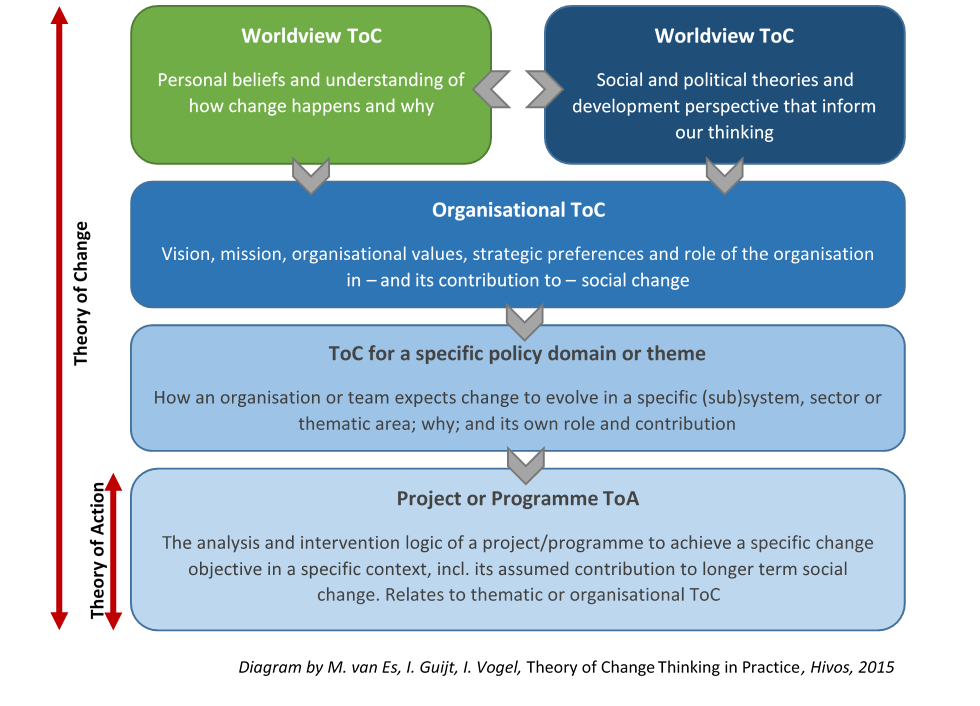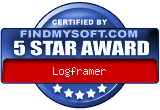The scope and purpose of your Theory of Change
As we’ve explained before, Theories of Change can be formulated at different levels:
- Worldview ToCs describe how – political, social, economic, cultural... – change happens in a society or even on a higher level. For instance how a society could transform from a dictatorship to a democratic system, or how organising small family farmers could reduce rural poverty.
- Organisational ToCs are closely linked to the vision and strategy of an organisation. The vision describes who the organisation thinks the desired change in society(/ies) may occur and how it chooses to position itself within this process. So on the one hand it describes a worldview like above, but it is more explicit about the role of your particular organisation. At strategy level the organisational ToC provides an overview in the choices of the organisation for the coming years. It identifies the precise societal changes (as in where exactly and in what contexts) that the organisation wants to contribute to and identifies the interventions or programmes that it wants to execute.
- Policy or topical ToCs sometimes exist in larger organisations that work on different subjects, where creating an overarching ToC is difficult or would create a confusion because of the volume of information that needs to be included. Often an organisation ToC can be complemented by various policy or topical ToCs.
- Programme / project level ToCs can be used as an alternative to a logical framework method. They focus on a very specific (country-wide or local) context to which the programme will contribute. In the project a Theory of Action is formulated to explain how the programme will contribute to the specific context. However the project’s Theory of Action can also contribute to a larger(topical/organisational/worldview) ToC. This link between a project’s limited Theory of Action and a broader ToC is what you see in the diagram below (by Hivos – 2015). But some organisations simply formulate a ToC at project level.

At what level you formulate your theories of change is entirely a matter of choice. For some organisations, ToC is used strictly for programme or project management and in that role it has replaced logical framework approaches. Other organisations use ToC strictly for strategic management or to analyse and describe the situation of their target group(s) and the change they desire (worldview ToC). You could use ToC of all levels in your organisation, but you are by no means required to do so. Even in programme management you can use ToC for certain programmes and outcome mapping or logical framework approaches for others.
A Theory of Change can serve different purposes
- As mentioned you can use a ToC to design a programme or project
- An additional purpose may be to improve the quality of audits. The idea here is to focus more on whether the resources have been used to effectively achieve the desired outcomes, instead of focusing on verifying if the proper procedures have been followed and the budget has been respected so that money was spent on the foreseen activities and outputs.
- On a strategic level, ToC may be helpful to develop strategic learning and knowledge generation within the organisation.
- ToC often facilitates the evaluation of programmes, because the long term outcomes of interventions (in other words their impact) has been clearly identified and described. Also the monitoring focuses very much on this level, rather than on monitoring direct outputs. Finally the assumptions underlying the theory of change have been clearly identified, in such a way that they can be actually tested by the evaluators.
- Because ToC takes a larger perspective of societal change and describes the role that different actors can play – including your own organisation – it provides clear leads on the possibilities for multi-actor collaboration. Not only that, but it also makes it possible to follow up the collective impact of such a collaboration. Rather than making the sum of the monitoring information from different actors (which more often than not is too different between organisations to actually add up), it is possible to analyse this collective impact from an overall viewpoint.
- Should an organisation wish to increase its efforts in a certain context, it is easier to scale up its interventions. Instead of just doing more of the same with more resources, ToC can give an indication on what additional roles the organisation can play.
- The ToC may also provide a clue on when an organisation could scale down and/or end its interventions, because it has fulfilled its role in the change process when it can say that the outcomes have been realised or solidly in the hands of other (local) actors.
Again not every Theory of Change needs to focus on all these possible purposes, but this overview does show that ToC can do more than help with strategic or operational management. However there is also a danger here: if you have too many purposes for your ToC then it may become too complicated, too detailed, too hard to understand and too difficult to put into practice. So it’s important to make choices and to clarify the purpose of your ToC (and develop other ToCs that may be similar but have a different emphasis).





Add new comment